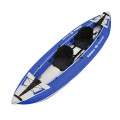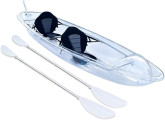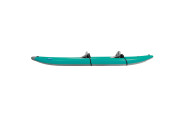The only experience better than the simple act of paddling, is sharing the paddling experience with another. A tandem sit on top kayak is one of the best and easiest ways for you and a friend or family member to take a trip on the water together.
By pairing up in a double sit on top kayak, a more experienced paddler can bring along a first-timer or assist a newer paddler in developing their skills. A tandem sit on top kayak is also a great way for friends or couples to share in the experience learning and paddling together. The communication skills you’ll develop—along with having a few laughs—are well worth the challenge of coordinating your paddling strokes!
Additionally, tandem sit on kayaks are ideal for taking a child paddling. Many two person sit on top kayaks can also be easily paddled solo, perfect for when a young paddling partner gets tired, or if you just need a kayak with more legroom or space for the family hound.
Tandem sit on top kayaks fall into two general categories: recreational and fishing. Recreational kayaks are stable, easy-to-use craft best suited to casual paddling on calm, sheltered waters like smaller lakes and slow-moving rivers. Think of fishing kayaks like souped-up recreational kayaks; these boats are packed with angler-specific accessories like rod holders, gear tracks, tank wells and tackle storage.
Some double sit on top kayaks even feature pedal drives, which allow riders and anglers to propel the kayak with their legs, like a bicycle, leaving hands free for fishing or photography.
New paddlers often ask why a sit-on-top kayak makes a good choice, compared to a sit-inside? When it comes to tandems, there are many more sit-on-top recreational and fishing designs to choose from compared to sit-insides. This is because there are some key elements that make sit-on-top kayaks especially well-suited to tandem paddling.
First, a sit-on-top kayak designed for recreational use allows both paddlers to easily climb on and off the kayak, without the hassle of entering an enclosed cockpit. This can be especially beneficial when learning how to launch and disembark from the craft as a team.
The open deck of a tandem sit on top kayak also provides greater mobility and interaction between partners. If your paddling partner needs a snack, you can easily swing around and open a drybag. If someone wants to go for a swim, they can just slide out of the kayak, while their partner continues to pilot.
Sit-on-tops are also ideal for fishing together, as one paddler can propel the kayak while the other casts or trolls, and partners can assist each other with landing fish or managing tackle. Some two person sit on top kayaks even allow the bow paddler to turn their seat around to face the stern paddler—perfect for relaxing or chatting on the water.
An important safety consideration for any kayak is the ability to recover should you capsize. Tandem recreational kayaks are very stable, but falling out of or flipping the kayak is still a possibility. When a sit-on-top kayak flips, it takes on almost no water. This means you and your paddling partner can grab the kayak, right it and simply pull yourself back onto the kayak. In contrast, a sit-inside kayak is a hollow cavity that, when capsized, can fill with water, making recovery much more difficult.
So, what is the best sit on top tandem kayak? In this guide, we’ll look at all of the top 2 person sit on top kayaks available on the market, including advice for buying new or used. Read on to learn more about the best tandem sit on top kayak for your paddling aspirations.
Top picks: Best tandem sit-on-top kayaks for 2024
The following tandem sit-on-top kayaks have received the highest star ratings by reviewers in our Paddling Buyer’s Guide. See and review all tandem sit-on-top kayaks here.
Best Tandem Sit-On-Top Kayaks
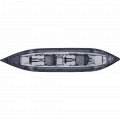
Blackfoot Angler 160
-first_product_boats.jpg)
BKC TK122 Angler Tandem Coastal Cruiser Kayak
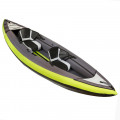
Itiwit KTI 100, 2-seat
Shop tandem sit-on-top kayaks
We’ve compiled every tandem sit on kayak in our Paddling Buyer’s Guide so you can find the best tandem sit on top kayak for your paddling endeavors. Check out specifications, prices, reviews and where to buy. Narrow your search with the links below, filtering tandem sit on top kayaks by type and the most popular brands available.
Shop by type
Shop by brand
Shop by store
Shopping for a used sit-on-top tandem kayak?
Buying used is a good way to find a great deal on a tandem sit on top kayak. Most tandem sit on kayaks are made from durable, long-lasting plastics that can take a lot of abuse. Because of their longevity and popularity, there is a fairly robust used market for these boats. When scanning tandem kayaks on Craigslist or other online classifieds, be sure to keep the following advice in mind.
Compare the cost of the used kayak to current retail prices for similar new kayaks. Ask yourself if the savings justify the potential wear and tear already placed on the used kayak. If you have budget constraints, or the price difference is a large percentage off of retail, you may have found a great deal. If the difference is small and the tandem kayak has significant wear, you may want to keep shopping, or purchase new instead.
The best way to appraise the condition of a used kayak is a thorough in-person inspection. Any used kayak is going to have scuffs and scratches on the bottom. Don’t sweat these surface level scratches, but keep an eye out for deep gouges and cracks along the hull or near hardware. If the kayak has been weakened and fractured at a stress point such as a screw hole, then the kayak will probably leak and this can also be a point of failure.
Another wear issue which can occur with a plastic kayak is oil canning. Oil canning is when a lumpy deformities warp the hull of the kayak, usually under the seating areas. This is fairly common on older rotomolded plastic kayaks and can be a result of storing the kayak flat on its hull for long periods of time. This isn’t necessarily a deal breaker, especially with a recreational kayak for casual use, but will decrease the value and performance of the kayak.
Also check the kayak top and hull for fading, which is a sign that it has been left out in the sun for long stretches of time. Sustained UV exposure not only fades the color but deteriorates the integrity of the plastic, leading to oil canning or even cracking.
With a secondhand tandem sit on top kayak, it is also important to check that outfitting—such as seats, backrests, hatches and foot rests—is complete and functional. Missing or broken components may be difficult to replace on an older model no longer in production.
After giving the tandem sit on top kayak a walk through, be sure to take it for a test paddle. Getting a kayak on the water is the best way to find out whether a kayak ultimately works for you in terms of fit, comfort and performance.
For more tips on what to look for when selecting a used kayak, read our article How To Buy A Used Kayak.
Tandem sit-on-top kayak buying guide
Looking to purchase the best tandem sit on top kayak for the types of paddling and waterways around you? Here are a few ideas to consider.
Size
For a recreational tandem sit on top kayak, especially one that will be paddled by two adults or used for fishing, a longer and wider hull will provide better stability, legroom and storage space. Look for a 2 person sit on top kayak that is at least 13 feet long and about 34 inches wide.
Remember, even with more space between the bow and stern paddler, paddling a tandem kayak requires some synchronization of strokes in order to avoid interference between paddles.
Material and construction
Another consideration is the material the kayak is made from, which will influence its performance and determine its weight. Tandem sit on top kayaks are available in a few different constructions and materials.
One of the most common constructions you’ll find for a two person sit on top kayak is rotomolded polyethylene. Rotomolding is a process in which plastic pellets are loaded into a mold. The mold is then heated and rotated within an industrial oven.
As the plastic liquifies it is pushed to the outside walls of the mold and takes the shape of the kayak. Kayaks made of rotomolded polyethylene are durable, impact-resistant and affordable. They’re also heavier than kayaks made from other materials
Less common are tandems sit on top kayaks made with thermoformed plastic. Thermoforming is a process in which sheets of plastic laminate are placed over a mold and heated to a pliable state to take the shape of the mold.
The top and bottom half of the kayak are produced separately and then chemically bonded to form the complete kayak. Thermoformed kayaks are lighter and more costly than rotomolded ones, with a shiny, durable finish.
Beside hard plastic kayaks, another construction option is inflatable tandem sit on top kayaks. Inflatables allow you to roll up your kayak for storage and transport. This means you don’t have to strap the kayak to a roof rack to reach the launch, or find a way to store a 12-foot or longer kayak. Inflatables are made of flexible plastics, most commonly PVC.
Besides being supremely portable, inflatable kayaks are lightweight, stable and forgiving, making them a good choice for family paddling or mild whitewater. The downside to inflatables is that they are slower with sluggish performance compared to rigid kayaks.
Fishing features
If you’re keen to do a lot of fishing from your tandem sit on top kayak, angler-specific models are available in all of these construction types. While recreational kayaks are fine for casual fishing, dedicated anglers will appreciated the added features of a fishing tandem sit on top, such as built-in rod holders, gear tracks, tank well and thoughtful storage for tackle and accessories. Pedal drive kayaks are another option that are especially popular with anglers.
Drainage
Drainage is important to consider when purchasing your double sit on top kayak. A sit-on-top needs a way for water that splashes into the kayak to escape.
For hard plastic kayaks, drainage is usually accomplished through the use of scuppers. These are holes that act as one-way valves through the floor of the kayak. They are usually under the paddlers’ seats and feet. Scuppers are designed to remove water when the kayak is moving forward, but if you are sitting still or traveling slowly, water can also enter through these scuppers. For this reason, check that the kayak includes scupper plugs, or if you will need to purchase them separately.
In an inflatable tandem kayak, water can accumulate around the paddlers’ seats unless the kayak has a self-bailing floor. These are typically only found on inflatable tandem kayaks designed for moderate and above whitewater use. The self bailing floor uses an inflatable bladder on the floor of the kayak to raise the paddlers off the bottom. The raised bladder also pushes water to the outside edges of the floor and allows it to drain through designated holes and stitching.
Ask the experts
Remember, you can only learn so much through online research. Your nearest paddling specialty shop provides one of the best resources to walk you through the different double sit on top kayak options. Local paddling shops have a great understanding of the different kayaks available, as well as the regional waterways where you plan to use your tandem kayak. They may also have kayaks available for you to demo with your paddling partner.
Still have questions about two person sit on top kayaks? Here are answers to a couple commonly asked questions.
-
Tandem sit-on-top vs sit-in
Tandem kayaks are available in both sit-on-top and sit-in styles, which have a few key differences. A sit-on-top tandem kayak is one in which the two paddlers are not enclosed within the kayak; instead, the cockpit for each paddler is molded onto the open deck of the kayak. For a sit-inside kayak, the paddlers slide into the hollow cockpits of the kayak. Each paddler is enclosed, or partially enclosed, within the kayak. The paddlers may also wear sprayskirts to keep water from entering the kayak.
Sit-on-top kayaks are easier to climb in and out of than a sit-inside kayak. Should the kayak capsize (flip over), it will not take on water so the paddlers can simply right it and climb back on. Because of their ease of use, sit-on-top tandem kayaks are a popular choice for casual paddling and kayak fishing on sheltered and slow-moving waterways, as well as kayak tours and rentals. Many tandem sit-on-top kayaks can also be easily converted for solo or two-person use, adding to their versatility.
Sit-inside tandem kayaks are designed for recreational paddling and kayak touring. Recreational tandem sit-inside kayaks should only be used on sheltered waters within easy swimming distance of shore. If these kayaks capsize, they can fill with water and may sink. Tandem sit-inside kayaks designed for longer tours have important safety features called bulkheads (interior walls within the hull of the kayak) that ensure positive flotation in the event of a capsize. These kayaks can be used on open waters by paddlers with appropriate skills and training.
-
Lightest tandem sit-on-top kayak
The lightest tandem sit-on-top kayak is likely an inflatable made of PVC or ripstop polyester, for example the Aquaglide Chinook 100, which weighs just 23 pounds. When it comes to rigid kayaks, tandem sit on tops made from thermoformed plastics—like some of those offered by Pelican Kayaks—are generally lighter than those made with rotomolded polyethylene.
This is because less material is required to make thermoformed kayaks. One of the lightest rotomolded tandem sit-on-tops available is Ocean Kayak’s Malibu Two, which weighs 63 pounds.
Tandem sit-on-top kayak reviews
For an in depth look at a specific tandem sit on top kayak models, read our expert reviews. You’ll find detailed information on everything from on-the-water performance to specifications, available modifications and where to purchase.



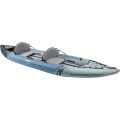
-first_product_boats.jpg)
-first_product_boats.jpg)

